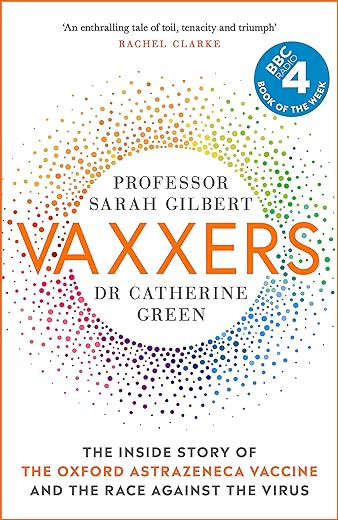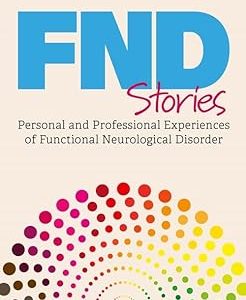Vaxxers: A Pioneering Moment in Scientific History
£7.60£19.00 (-60%)
THE SUNDAY TIMES BESTSELLER AND RADIO 4 BOOK OF THE WEEK
*Chosen as a Book of the Year by the Financial Times, Sunday Times, Daily Mail, Prospect, Guardian and The Times*
This is the story of a race – not against other vaccines or other scientists, but against a deadly and devastating virus.
On 1 January 2020, Sarah Gilbert, Professor of Vaccinology at Oxford University, read an article about four people in China with a strange pneumonia. Within two weeks, she and her team had designed a vaccine against a pathogen that no one had ever seen before. Less than 12 months later, vaccination was rolled out across the world to save millions of lives from Covid-19.
In Vaxxers, we hear directly from Professor Gilbert and her colleague Dr Catherine Green as they reveal the inside story of making the Oxford AstraZeneca vaccine and the cutting-edge science and sheer hard work behind it.
This is their story of fighting a pandemic as ordinary people in extraordinary circumstances. Sarah and Cath share the heart-stopping moments in the eye of the storm; they separate fact from fiction; they explain how they made a highly effective vaccine in record time with the eyes of the world watching; and they give us hope for the future.
Vaxxers invites us into the lab to find out how science will save us from this pandemic, and how we can prepare for the inevitable next one.
Read more
Additional information
| Publisher | Hodder & Stoughton (8 July 2021) |
|---|---|
| Language | English |
| Hardcover | 352 pages |
| ISBN-10 | 1529369851 |
| ISBN-13 | 978-1529369854 |
| Dimensions | 16.51 x 3.18 x 24.13 cm |










by Henry James
The Prime Minister had yet to take Covid seriously by February 2020, but the authors of Vaxxers at the same time knew the stakes were high and were closely monitoring the situation in China and Europe.
Professor Sarah Gilbert and Dr Catherine Green have written about their roles in the development of The Oxford AstraZeneca vaccine.
Professor Gilbert comes up with an answer early in the book to anyone sceptical of the dangers of Covid: “By the end of the year, it (Covid) had killed more people in one year than any infectious disease had done for over a century.”
She writes how she first read about the virus on New Year’s Day 2020 on a website, which revealed details of ‘pneumonia of unknown cause’ in Wuhan, China. Later she adds, “this was a global problem that required a global response.”
It was also interesting to read that the group, at first, saw the fact AstraZeneca came on board as a problem rather than a solution. The company made many demands from an early stage.
The authors compare the process of making a vaccine to making bread, “partly because making vaccine from starting material….is like making sourdough from a starter.”
The reader is also left full of admiration for the group who were able to make a vaccine, which usually takes ten years, in one year without cutting any corners. They write they were able to do this because of all the other work they had done in planning for Disease X.
Unfortunately, Dr Green believes Disease Y is coming.
The book comes to the conclusion that no corner of the globe can consider itself safe when a new infectious disease gets a hold.
This book is a terrific insight into how the AstraZeneca vaccine was produced.
by Hande Z
Although written by two scientists, this is not a dense, scientific book inaccessible to the layman. On the contrary, it is a clear, accessible book, more reassuring than exciting. Gilbert and Green begins their story in November 2020, but explain as they went along, the kind of work that they had been doing with vaccines for the MERS virus had helped them respond quickly to the Corvid-19 virus that swept through the world that year.
This book explains many questions that are abound to this day regarding vaccines. What are the differences, and are they safe? In a calm and assuring tone, the authors tell us that not all vaccines ae the same, but it is a misconception that they ‘contain lots of things that we would not want injected into us’. The ingredients may not be familiar to the layman, but they, the authors explain, ‘are in fact substances that are found naturally in the body’.
Nonetheless, there are three kinds of risks that we should be informed when taking the vaccines. The first is that not all vaccines are safe for everyone. Some contain weakened versions of the pathogens may adversely affect people with compromised immune systems. Some other vaccines work in different ways that may not have such adverse effects on immunosuppressed people. Vaccines like Pfizer and Moderna do not permanently change our DNA because the mRNA used in the vaccine does not enter our cell’s nucleus where DNA is stored.
The second kind of risk is the risk of side effects, but these are generally mild. They include soreness and fever, and are over within a few days. The third safety concern is that vaccinated people might develop a severe form of the disease when they are subsequently exposed to the pathogen. So far, the authors tell us, the trial reports show that when such cases occur, the vaccinated people only exhibit a mild form of the disease.
Although the book has many interesting aspects, comforting the reader on the safety aspects is probably the most important part of the book. As the authors say, ‘Taking a vaccine is not risk-free – because nothing is. But not taking a vaccine is also not risk-free. You risk getting the disease yourself, and also passing it on to others.’
by Di R
What a fascinating book, and well done to Sarah Gilbert and Catherine Green on their amazing achievement. Having watched a great many interviews with those who have only bad things to say about vaccines, I totally understand that the history of some have been nothing short of catastrophic and one can well understand vaccine hesitancy amongst some. However, I am assured that the care that has gone into preparing the “Oxford” vaccine and then testing its efficacy was well managed.
The book examines many of the allegations as to why we should be wary and gives well reasoned responses to these. It’s clear that many antivaxxers need to update their views as lessons from the past have been learned and what they are injecting into our arms now does not endanger our health in the same ways as older vaccines.
by The Electrician
In my view the only solution to the Covid Delta Variant is effective vaccination. This book charts the skill, expertise and massive effort that delivered a vaccine in a very short time. History will show that a massive number of lives will have been saved. The vaccine will also reduce the economic cost which blights millions of lives. The book explains how the delivery of a highly effective vaccine in such a short time was not a piece of luck or corner cutting. The authors had the skills and experience to use a platform they had been working on for years to solve a massive problem and build a team of people and businesses to deliver something the world desperately needs. An uplifting record of human endeavour for which we need all to be grateful for. Perhaps if the antivaxxers took the time to read this they would understand that the benefits of getting vaccinated massively outweigh the risks. Sadly this Covid pandemic has shown that that our politicians and a lot of “influencers” do not have the intelligence or skills to provide good leadership. My thanks to everyone involved, I hope eventually almost everyone will appreciate what your efforts have delivered